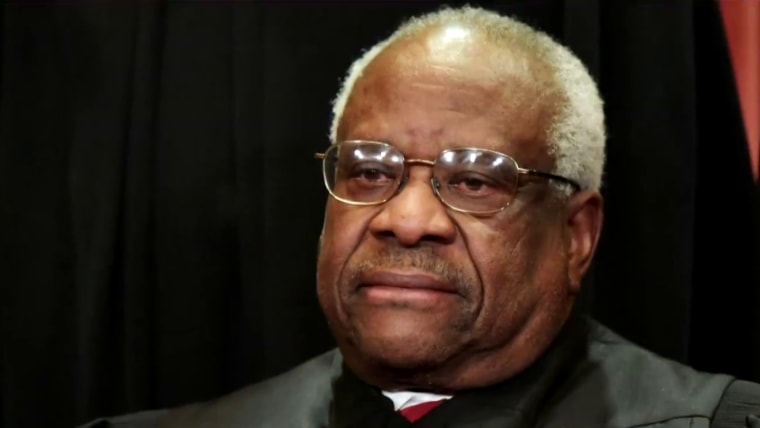Supreme Court Justice Clarence Thomas’ latest ethics controversy is relatively straightforward. A stunning ProPublica report found that the far-right jurist has spent the last couple of decades accepting gifts and luxury trips from a Republican megadonor, which Thomas failed to disclose.
This has led to a series of concerns about whether the conservative crossed legal lines, and several congressional Democrats have broached the subject of possible impeachment.
My general expectation was that Thomas would ignore the controversy — an approach he’s taken before — confident in the assumption that he’s accountable to no one. Fortunately, my expectation was mistaken, and the associate justice issued a written response earlier today. It read in its entirety:
“Harlan and Kathy Crow are among our dearest friends, and we have been friends for over twenty-five years. As friends do, we have joined them on a number of family trips during the more than quarter century we have known them. Early in my tenure at the Court, I sought guidance from my colleagues and others in the judiciary, and was advised that this sort of personal hospitality from close personal friends, who did not have business before the Court, was not reportable. I have endeavored to follow that counsel throughout my tenure, and have always sought to comply with the disclosure guidelines. These guidelines are now being changed, as the committee of the Judicial Conference responsible for financial disclosure for the entire federal judiciary just this past month announced new guidance. And, it is, of course, my intent to follow this guidance in the future.”
While I’m glad Thomas acknowledged the controversy and took a step toward explaining himself, there are a few flaws in his statement.
1. Thomas and his wife have apparently been friends with the Republican megadonor and his wife “for 25 years.” That’s nice, but Thomas joined the Supreme Court in 1991, which was 32 years ago. In other words, he’d already been a sitting justice for several years when he started palling around with Crow, who has reportedly “spent millions on ideological efforts to shape the law and the judiciary.”
2. The Thomases and the Crows have been on “a number of family trips.” That’s nice, too, but it’s irrelevant to the subject at hand.
3. Thomas was advised that “personal hospitality from close personal friends” didn’t need to be reported. Perhaps not. But I’m curious how many people would reasonably consider luxury trips worth hundreds of thousands of dollars to be “personal hospitality.” If Crow had Thomas over to his place for breakfast, that would be “personal hospitality.” What ProPublica described is a qualitatively different kind of generosity.
What’s more, Thomas has repeatedly over the course of several years faced public criticisms about the gifts he’s received but failed to disclose. It’s a little late for the justice to suggest he didn’t realize there might be a problem with his private conduct.
4. Thomas noted, almost in passing, that Crow “did not have business before the Court.” The truth is more nuanced: As a 2011 report from The New York Times noted, “Mr. Crow has not personally been a party to Supreme Court litigation, but his companies have been involved in federal court cases, including four that went to the appellate level. And he has served on the boards of two conservative organizations involved in filing supporting briefs in cases before the Supreme Court.”
What’s more, when Thomas and Crow took trips, they were sometimes joined by other powerful conservatives with their own judicial interests.
5. Thomas went on to claim that he’s “endeavored to follow” the advice he received throughout his tenure, adding that he’s “always sought to comply with the disclosure guidelines.” Given the recent reporting that the justice altered his disclosure practices in the wake of scrutiny, there’s at least some evidence to the contrary.
6. Thomas concluded that disclosure guidelines “are now being changed,” which is true. It doesn’t explain his apparent disregard for his obligations for many years.
To be sure, it’s notable that the justice took the step of issuing a statement at all. Perhaps he thought it was the right thing to do given the circumstances; perhaps he was encouraged to defend himself from one or more of his colleagues.
Either way, if Thomas expects this mess to go away, he’ll have to do better than today’s explanation.

